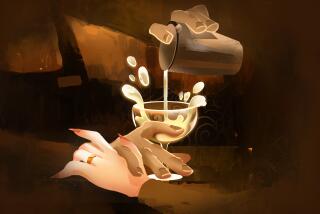The Ties That Bind
- Share via
When my grandfather, David Oppenheim, and my grandmother, Amalie Pollak, decided to marry, my grandfather’s parents doubted the wisdom of their son’s decision to marry a woman three years older than he was.
In the spring of 1905, David traveled from Vienna, where he was a student, to Brno in Moravia to persuade his parents to accept the union. His task, he wrote to Amalie, was to get his parents to see that “what binds us, pushes time away.”
What David meant by that is clear from letters he had previously written to Amalie. He had told her, for example, that the foundation of his relationship with her was “the clear insight into the worth of your character.”
This is, by modern-day standards, a rather cool evaluation of the beloved. David and Amalie were well aware of that. They were, he had said, “on a path that lies far, miles away, from that which ‘lovers’ tread.”
One reason why the path they were taking was unusual was that David had earlier been in love with a young man called Victor and Amalie appears to have had an erotic interest in women. It was not physical desire for each other that initially brought them together.
Today this would be considered an inauspicious beginning for a marriage.
Writing about my grandparents’ marriage in my recent memoir of my grandfather led me to reflect on what is the best basis for a good marriage. Today, it is rare for couples to consider anything except love. Nor are they willing to analyze this notion of love.
Ask your friends -- especially those already in relationships -- whether they can imagine loving one person while finding another more attractive sexually. If they are anything like my friends, they will squirm uncomfortably and not give a straight answer. Are we fearful that acknowledging that our partners are not the ones who attract us most would endanger our relationships?
But if experience teaches us anything, it is that a marriage based on being really hot for each other can hardly be said to be grounded on something that “pushes time away.” If sexual attractiveness is so central to people’s idea of the person they want to marry, this is a relatively new, and culturally specific, idea.
My grandfather was a scholar of ancient Greece and Rome, and so took a broader view. He had probably read Xenophon’s “Oeconomicus,” in which the well-respected Ischomachus tells Socrates that soon after he was married, he asked his wife: “Tell me, woman, have you thought yet why it was that I took you and your parents gave you to me?” And he added: “That it was not for want of someone to spend the night with -- this is obvious, I know, to you too.” Ischomachus then answers his own question: He chose his wife “as the best partner for the household and children.”
David’s letters to Amalie show that he too was not simply seeking “someone to spend the night with” but a partner who would, through her knowledge of his character, be a source of good counsel and support.
When my grandparents wed, arranged marriages were still common in many Jewish (and some non-Jewish) communities in Eastern Europe, including parts of Austria-Hungary. Even among the more modern Jews of Moravia, if Amalie and David had lived one or two generations earlier they would probably have had little choice about whom they were to marry.
Matchmakers would bring young couples together, with a chaperon, of course, and they spoke only a few words to each other before they were married.
Before marriage there was often neither love nor an appreciation of the worth of the other’s character. With luck, one or both of those would come afterward.
Though my grandparents chose each other, their relationship shared something with the tradition of arranged marriages -- the idea that romantic love is not the key to a good marriage. Whether this was because romantic love for a member of the opposite sex did not come naturally to David and Amalie, or because of a more philosophical view of the nature of love, I do not know. What is clear is that my grandfather married a woman whom he admired for her intellect and fine psychological insight rather than for her physical appeal.
Even after they had decided to marry, he did not think her beautiful. Instead, it was his sense of the worth of her character that formed the basis for his decision to spend his life with her. The passion seems to have come later -- sufficient, in any case, to produce two children, my mother and my aunt.
The relationship between my grandparents lasted more than 30 years and was ended only by David’s death in the overcrowded, underfed Nazi ghetto of Theresienstadt in Czechoslovakia.
Their marriage was built on a sharing and respecting of each other’s beliefs and on a sense that they were equal partners in life’s journey. People who knew my grandparents have described the marriage as “exemplary,” “wonderful” and “probably the best marriage I have ever encountered.”
Perhaps their path was a wiser one than that which “lovers” tread.
Peter Singer is a bioethics professor at Princeton University and author of “Pushing Time Away: My Grandfather and the Tragedy of Jewish Vienna” (Ecco, 2003).


